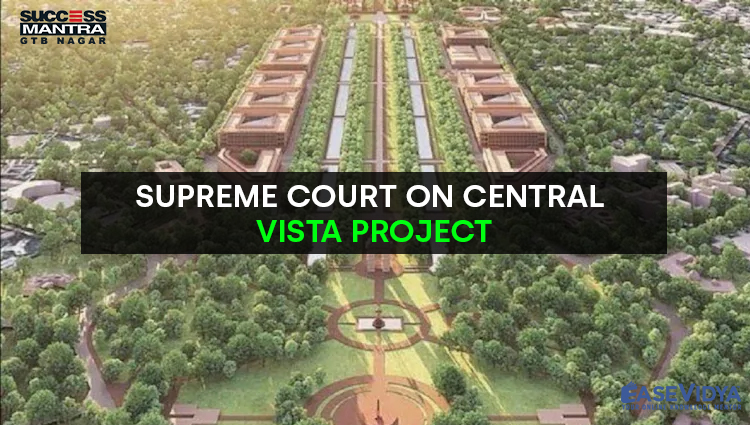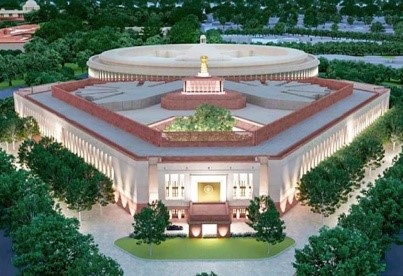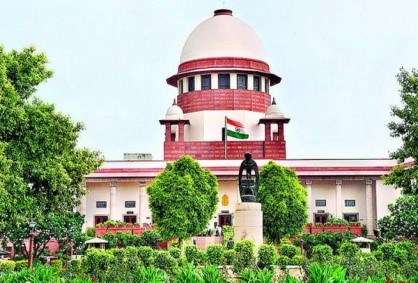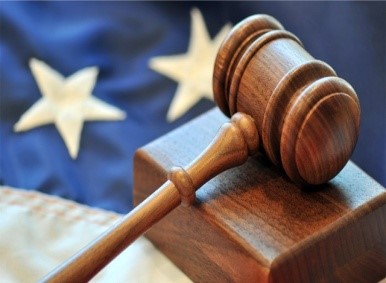
SUPREME COURT ON CENTRAL VISTA PROJECT
SUPREME COURT ON CENTRAL VISTA PROJECT
Recently, the Supreme Court (SC) refused to treat the Central Vista project as a unique one requiring greater or heightened judicial review. The SC said the government was “entitled to commit errors or achieve successes” in policy matters without the court’s interference as long as it follows constitutional principles.
CENTRAL VISTA PROJECT

The Central Vista Project envisages redeveloping Central Vista as a world-class public space, restoring its grandeur as an architectural icon, housing modern facilities for the efficient functioning of the administration, strengthening cultural institutions and commemorating the 75th year of Indian Independence.
Aatmanirbhar Bharat: Lok Sabha Speaker Om Birla stated that the new Parliament building will be one such temple of Aatmanirbhar Bharat, reflecting the diversity of India. The new Parliament building will be 17,000 sq km bigger than the old Parliament building. The building will span across 64,000 sq. km. area and will be built on plot number 118 of the Parliament House Estate. The projected cost of the new Parliament building is Rs. 971 crores. The new Parliament building is expected to be completed by 2022 and a common Central Secretariat by March 2024.
POWER OF JUDICIAL REVIEW
The Indian Constitution adopted the Judicial Review on lines of the American Constitution. It is a type of court proceeding in which a judge reviews the lawfulness of a decision or action made by a public body. In other words, judicial reviews are a challenge to the way in which a decision has been made, rather than the rights and wrongs of the conclusion reached.
CONCEPTS OF LAW:

• Procedure Established by Law: It means that a law enacted by the legislature or the concerned body is valid only if the correct procedure has been followed to the letter.
• Due Process of Law: It is a doctrine that not only checks if there is a law to deprive the life and personal liberty of a person but also ensures that the law is made fair and just.
• India follows Procedure Established by Law. It is the power exerted by the courts of a country to examine the actions of the legislatures, executive and administrative arms of government and to ensure that such actions conform to the provisions of the nation’s Constitution. Judicial review has two important functions, like, of legitimizing government action and the protection of constitution against any undue encroachment by the government. Judicial review is considered a basic structure of the constitution (Indira Gandhi vs Raj Narain Case 1975). Judicial review is also called the interpretational and observer roles of the Indian judiciary. Suo Moto cases and the Public Interest Litigation (PIL), with the discontinuation of the principle of Locus Standi, have allowed the judiciary to intervene in many public issues, even when there is no complaint from the aggrieved party.
TYPES OF JUDICIAL REVIEWS
• Reviews of Legislative Actions: This review implies the power to ensure that laws passed by the legislature are in compliance with the provisions of the Constitution.
• Review of Administrative Actions: This is a tool for enforcing constitutional discipline over administrative agencies while exercising their powers.
• Review of Judicial Decisions: This review is used to correct or make any change in previous decisions by the judiciary itself.
• Importance of Judicial Review: It is essential for maintaining the supremacy of the Constitution. It is essential for checking the possible misuse of power by the legislature and executive. It protects the rights of the people. It maintains the federal balance. It is essential for securing the independence of the judiciary. It prevents tyranny of executives.
• Problems with Judicial Review: It limits the functioning of the government. It violates the limit of power set to be exercised by the constitution when it overrides any existing law. In India, a separation of functions rather than of powers is followed. The concept of separation of powers is not adhered to strictly. However, a system of checks and balances has been put in place in such a manner that the judiciary has the power to strike down any unconstitutional laws passed by the legislature. The judicial opinions of the judges once taken for any case become the standard for ruling other cases. Judicial review can harm the public at large as the judgment may be influenced by personal or selfish motives. Repeated interventions of courts can diminish the faith of the people in the integrity, quality, and efficiency of the government.
CONSTITUTIONAL PROVISIONS FOR JUDICIAL REVIEW

There is no direct and express provision in the constitution empowering the courts to invalidate laws, but the constitution has imposed definite limitations upon each of the organs, the transgression of which would make the law void. The court is entrusted with the task of deciding whether any of the constitutional limitations has been transgressed or not. Some provisions in the constitution supporting the process of judicial review are:
• Article 372 (1) establishes the judicial review of the pre-constitution legislation.
• Article 13 declares that any law which contravenes any of the provisions of the part of Fundamental Rights shall be void.
• Articles 32 and 226 entrusts the roles of the protector and guarantor of fundamental rights to the Supreme and High Courts.
• Article 251 and 254 states that in case of inconsistency between union and state laws, the state law shall be void.
• Article 246 (3) ensures the state legislature’s exclusive powers on matters pertaining to the State List.
• Article 245 states that the powers of both Parliament and State legislatures are subject to the provisions of the constitution.
• Articles 131-136 entrusts the court with the power to adjudicate disputes between individuals, between individuals and the state, between the states and the union; but the court may be required to interpret the provisions of the constitution and the interpretation given by the Supreme Court becomes the law honoured by all courts of the land.
• Article 137 gives a special power to the SC to review any judgment pronounced or order made by it. An order passed in a criminal case can be reviewed and set aside only if there are errors apparent on the record.
CONCLUSION
With the power of judicial review, the courts act as a custodian of the fundamental rights. With the growing functions of the modern state, judicial intervention in the process of making administrative decisions and executing them has also increased. When the judiciary surpasses the line of the powers set for it in the name of judicial activism, it could be rightly said that the judiciary then begins to invalidate the concept of separation of powers set out in the Constitution. Making laws is the function and duty of the legislature, to fill the gap of laws and to implement them in a proper manner is the responsibility of the executive. So that the only work remaining for the judiciary is interpretations. Only a fine equilibrium between these government bodies can sustain the constitutional values.
QUESTIONS (1-5)
Q.1 Which of the following statements is/are incorrect regarding the Central Vista Project recently laid by the Central Government?
A. The project envisages building of the new Supreme Court: ANSWER
B. The project will facilitates the programme of the Atmanirbhar Bharat.
C. The total cost of the project will be 971 crore
D. None of the Above
Q.2 Recently, the Supreme court heard the challenge made by the petitioners against the Development of Central Vista Project on which of three main grounds?
A. change of land use
B. violations of municipal law
C. violations of environmental law
D. All of the above: ANSWER
Q.3 The power or the provisions of Judicial Review which was enshrined in the Indian Constitution was taken from ________?
A. Weimar Constitution of Germany
B. British Constitution
C. American Constitution: ANSWER
D. Government of India Act, 1935
Q.4 By which of the following case laws it is held by the Apex Court that the Judicial review is considered a basic structure of the constitution?
A. Ramesh Thapper vs State of Madras
B. Waman Rao v. Union of India
C. Shankari Prasad vs Union of India
D. Indira Gandhi vs Raj Narain Case: ANSWER
Q.5 Which of the Articles of the Indian Constitution declares that any law which contravenes any of the provisions of the part of Fundamental Rights shall be void?
A. Article 12
B. Article 13: ANSWER
C. Article 51
D. Article 358












0 Comment